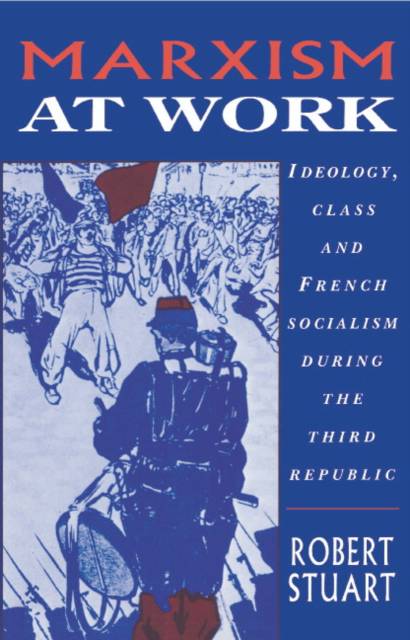
Door een staking bij bpost kan je online bestelling op dit moment iets langer onderweg zijn dan voorzien. Dringend iets nodig? Onze winkels ontvangen jou met open armen!
- Afhalen na 1 uur in een winkel met voorraad
- Gratis thuislevering in België vanaf € 30
- Ruim aanbod met 7 miljoen producten
Door een staking bij bpost kan je online bestelling op dit moment iets langer onderweg zijn dan voorzien. Dringend iets nodig? Onze winkels ontvangen jou met open armen!
- Afhalen na 1 uur in een winkel met voorraad
- Gratis thuislevering in België vanaf € 30
- Ruim aanbod met 7 miljoen producten
Zoeken
Marxism at Work
Ideology, Class and French Socialism During the Third Republic
Robert C Stuart, Robert Stuart
Hardcover | Engels
€ 223,45
+ 446 punten
Omschrijving
Despite a century of debate and criticism, Marxism as a mass ideological practice has remained an elusive topic. This book examines Marxist socialism as a mode of understanding and self-understanding treasured and transmitted by thousands of anonymous militants. It focuses on the Parti Ouvrier Francais, the "Guesdists," an archetypal movement of Marxism's "Golden Age" before World War I, the period when Marxist socialism evolved from sect to mass movement. Thousands of French socialists adopted Marxism due to the effectiveness of vulgar Guesdist polemic rather than Marx's profound theoretical works, and entire communities were converted to an austere but messianic socialism that still affects French politics today. This book traces the doctrine's birth through conflict with liberals, proto-fascists, and anarchists; its "making" of a working class, and its attempted seduction of the middle class; and its confusion before the alternative social visions of the Catholic devout, racist nationalists, and feminists.
Specificaties
Betrokkenen
- Auteur(s):
- Uitgeverij:
Inhoud
- Aantal bladzijden:
- 536
- Taal:
- Engels
Eigenschappen
- Productcode (EAN):
- 9780521415262
- Verschijningsdatum:
- 28/08/1992
- Uitvoering:
- Hardcover
- Formaat:
- Genaaid
- Afmetingen:
- 152 mm x 229 mm
- Gewicht:
- 952 g

Alleen bij Standaard Boekhandel
+ 446 punten op je klantenkaart van Standaard Boekhandel
Beoordelingen
We publiceren alleen reviews die voldoen aan de voorwaarden voor reviews. Bekijk onze voorwaarden voor reviews.











